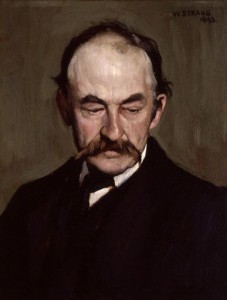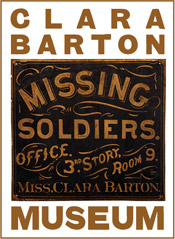Drummer Hodge
Amelia Grabowski, Education and Outreach Specialist
The second installment of our Art and War series takes us far from Clara Barton’s DC residence to discuss familiar themes of death far from home and the lack of closure therein.
Drummer Hodge
By Thomas Hardy
I
They throw in Drummer Hodge, to rest
Uncoffined – just as found:
His landmark is a kopje-crest
That breaks the veldt around;
And foreign constellations west
Each night above his mound.
II
Young Hodge the Drummer never knew –
Fresh from his Wessex home –
The meaning of the broad Karoo,
The Bush, the dusty loam,
And why uprose to nightly view
Strange stars amid the gloam.
III
Yet portion of the unknown plain
Will Hodge for ever be;
His homely Norther breast and brain
Grow to some Southern tree,
And strange-eyed constellations reign
His stars eternally.

The poet, Thomas Hardy
Despite the reference to “some Southern tree,” this isn’t a poem about the Civil War but rather World War I. Thomas Hardy is a prolific British writer, best known for his novels like Far From the Madding Crowd, however, Hardy was most proud of his poetry. In the poem “Drummer Hodge,” Hardy imagines the burial of a young drummer buried far from home.
Much of the imagery is reminiscent of imagery used to describe Civil War deaths, especially the motif of being buried far from home. During the war, the hardship of being buried far from home was reflected in the popularity of songs like “Carry Me Back to Old Virginny.” Some of the people writing Clara Barton wanted to locate their loved ones either to bring their bodies home or to visit there bodies, thereby bringing a bit of home to them.
Over half a century later, Hardy is still concerned with being buried under “strange stars.” Those familiar with Thomas Hardy’s work will know that he highly valued harmony with the natural world, and therefor being eternally surrounded by a “strange-eyed” landscape would be a great loss.
Today, the preoccupation with not being buried in an unfamiliar landscape remains. Old Crow Medicine Show included a cover of Carry Me Back to Virginia on their 2012 album (titled “Carry Me Back”). In the recent blockbuster The Martian, for the first half of the movie the powers-that-be at NASA are both motivated by and motivate others by promising to bring Matt Damon’s dead body home (this is of course before they discover he’s alive—but spoilers.)
In this day and age, when it not only not unusual but expected and encouraged to live your life in many different places and far from home, why does the image of being buried far from home still hold so much power? Share your thoughts about this and the other motifs in the poem in the comments.
Tags: Art and War, Burial, Death, Poem, Poetry, Thomas Hardy, World War I, WWI Posted in: Art and War
